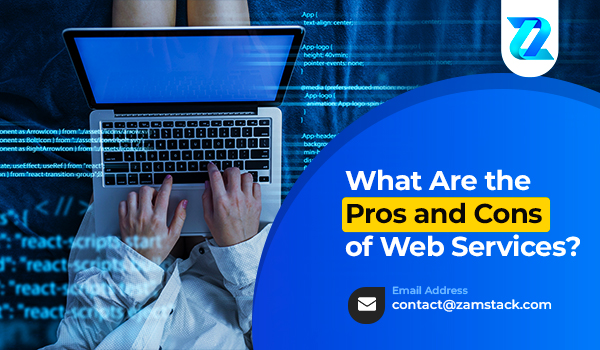In today’s digital age, web services are like the glue that holds modern software systems together. From mobile apps to e-commerce platforms, everything relies on these services for smooth operation. But like any technology, web services come with both benefits and limitations. So, let’s dive deep and explore what makes them shine—and where they fall short.
What Are Web Services?
A web service is a software function provided at a network address over the web. It enables communication between different applications or systems using standard protocols like HTTP, XML, and JSON.
Why Web Services Matter in Modern Business
Imagine you’re trying to connect a mobile app to a cloud server or integrate a CRM with your e-commerce platform—web services make that possible. Whether you’re a startup or an enterprise, web services allow seamless API integrations, reduce operational silos, and power automation.
Understanding Web Services
Definition and Core Concept
Web services are modular, self-contained applications that can be described, published, and invoked over the web. Think of them as middlemen between systems—they receive requests, process data, and send back responses.
Common Types of Web Services
RESTful Web Services
-
Lightweight
-
Uses JSON
-
Ideal for mobile and web apps
SOAP Web Services
-
Heavier protocol
-
Uses XML
-
Preferred in enterprise-level apps due to strict security and structure
Key Technologies Behind Web Services
-
XML – Data formatting standard used in SOAP
-
JSON – Lightweight alternative used in REST APIs
-
HTTP/HTTPS – Communication backbone that delivers requests and responses
Pros of Web Services
1. Platform Independence
Web services are platform-agnostic. They allow apps written in Java to communicate with ones in PHP, Python, or .NET seamlessly. This makes them perfect for cross-platform solutions.
2. Enhanced Interoperability
One of the major benefits of web services is interoperability. Different systems, regardless of their tech stack, can talk to each other using standard protocols.
3. Reusability and Modularity
You can reuse the same web service across multiple apps. For instance, a payment gateway API can be used by both a mobile app and a website.
4. Scalability and Flexibility
Need to expand your service offering? Web services allow easy scaling—whether you’re adding more features or more users.
5. Cost Efficiency
Web services reduce the need to build new software from scratch. You can integrate third-party solutions (like Google Maps or Stripe) without developing them yourself.
6. Improved Integration Across Systems
They serve as bridges for integrating legacy systems with modern apps. This is a game-changer for enterprises undergoing digital transformation.
7. Real-Time Communication
Real-time data sharing is crucial in today’s fast-paced world. Web services support real-time responses in apps like stock trading, ride-hailing, and messaging.
Cons of Web Services
1. Security Concerns
Without proper encryption and authentication, web services can be vulnerable to attacks. Especially SOAP services, if not configured securely, may leak sensitive data.
2. Performance Issues
Heavy XML or JSON payloads can slow down performance—especially on mobile networks. Also, poorly optimized web services can overload servers.
3. Complexity in Design and Maintenance
Designing scalable and secure web services can get complex. Maintaining documentation, version control, and backwards compatibility takes effort.
4. Internet Dependency
No internet, no service! Web services depend entirely on network availability, making them less reliable in offline scenarios.
5. Compatibility and Versioning Challenges
As web services evolve, newer versions might not work well with older clients unless backward compatibility is maintained.
Zamstack Technologies – Your Web Development Partner
At Zamstack Technologies, we don’t just build web services—we build smart, scalable, and secure digital infrastructure tailored to your business needs.
Our Web Service Development Expertise
From REST API development to enterprise-level SOAP services, we cover it all with a future-proof mindset.
Custom Solutions for Every Business
Whether you’re a SaaS company, e-commerce brand, or fintech startup, we offer custom web development services that meet your unique needs.
Why Choose Zamstack Technologies
-
Security-first architecture
-
Scalable backend services
-
Fast delivery with post-launch support
We ensure your systems run like a well-oiled machine with our top-notch web service integrations.
Real-Life Examples of Web Services in Action
E-commerce Integrations
Think Shopify and PayPal talking to each other—yes, that’s done via web services.
Cloud Applications
AWS, Google Cloud, and Azure all offer APIs/web services that developers use to build scalable apps.
Mobile App Backends
From push notifications to user authentication—most mobile apps use RESTful web services to function properly.
The Future of Web Services
Evolution Toward Microservices
The future is modular. Microservices architecture, powered by APIs, will continue replacing traditional monoliths.
AI and IoT Integration
From smart homes to predictive analytics, web services are powering intelligent, connected ecosystems.
Conclusion
Web services are the backbone of modern digital ecosystems. While they come with their set of challenges, the advantages far outweigh the drawbacks—especially when implemented correctly.
By partnering with a trusted company like Zamstack Technologies, you can ensure your web services are secure, scalable, and future-ready.
FAQs
1. What are web services used for?
Web services allow applications to talk to each other and exchange data, making them vital for APIs, integrations, and automation.
2. Which is better, REST or SOAP?
REST is ideal for lightweight and fast operations, while SOAP is better for enterprise-level applications needing strict security and standards.
3. Are web services safe to use?
Yes, if properly implemented with HTTPS, authentication tokens, and secure protocols.
4. Can I use web services without coding?
Yes, many no-code tools now let users connect web services using visual workflows (e.g., Zapier, Make, or Bubble).
5. What makes Zamstack Technologies different?
Zamstack Technologies provides tailored, secure, and scalable web development services with a focus on your business goals.











